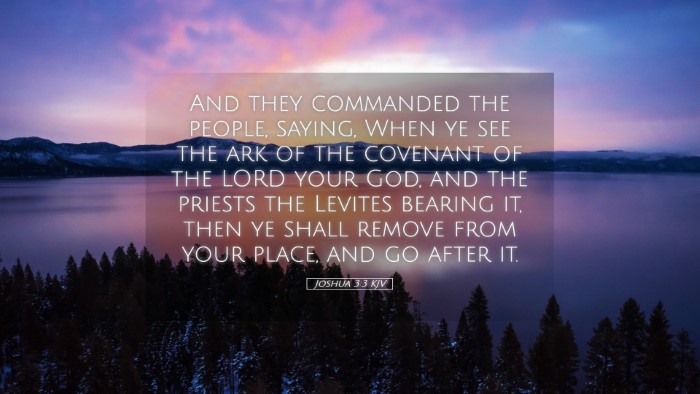Old Testament
Genesis Exodus Leviticus Numbers Deuteronomy Joshua Judges Ruth 1 Samuel 2 Samuel 1 Kings 2 Kings 1 Chronicles 2 Chronicles Ezra Nehemiah Esther Job Psalms Proverbs Ecclesiastes Song of Solomon Isaiah Jeremiah Lamentations Ezekiel Daniel Hosea Joel Amos Obadiah Jonah Micah Nahum Habakkuk Zephaniah Haggai Zechariah MalachiJoshua 3:3
Joshua 3:3 KJV
And they commanded the people, saying, When ye see the ark of the covenant of the LORD your God, and the priests the Levites bearing it, then ye shall remove from your place, and go after it.
Joshua 3:3 Bible Commentary
Commentary on Joshua 3:3
Verse Context: The verse reads, “And they commanded the people, saying, When ye see the ark of the covenant of the LORD your God, and the priests the Levites bearing it, then ye shall remove from your place, and go after it.” This passage is part of the narrative describing the Israelites' preparations to cross the Jordan River into the Promised Land.
Spiritual Significance of the Ark
Matthew Henry's Commentary: The ark of the covenant represents the presence of God among His people. In instructing the Israelites to follow the ark, they are being reminded to prioritize their relationship with God. The ark contained the tablets of the Law, symbolizing God’s covenant with Israel—His promise to be their God and for them to be His people.
Albert Barnes adds that the ark’s movement signifies divine direction. The Israelites are called to move not on human initiative but in accordance with the Lord's guidance. This emphasis on following divine instructions remains pivotal for Christians today, illustrating that obedience is key in our walk of faith.
Preparation for God’s Work
Adam Clarke's Insights: The act of moving when the ark moves is a clear metaphor for obedience and readiness. Clarke emphasizes that God prepares His people for great undertakings. The Israelites were not to go forth in their own strength but to be prepared for a miraculous act—crossing a river at flood stage. The emphasis marks a transition moment in Israel's history, portraying the necessity of divine intervention.
As Clarke suggests, this directive is applicable today. Believers are also called to wait for God's leading, underscoring that only through His guidance can we successfully traverse the obstacles before us.
The Role of Leadership
The Role of the Priests: The Levites, as bearers of the ark, play a fundamental role. Henry notes that it is the responsibility of spiritual leaders to carry forth God’s covenant and lead others in following. Their presence signifies the transition from reliance on the leadership of Moses to a new chapter under Joshua.
Barnes highlights that the priests' involvement emphasizes that moving forward spiritually involves following God’s appointed leaders, who must be anchored in God's word and His presence. Thus, there is a collective aspect to spiritual following, bound in community as they face new challenges together.
Covenantal Relationship and Faith
The Symbolism of the Ark: The instructions given in this verse remind the Israelites of their covenant with God. Clarke points out that the ark symbolizes God's faithfulness, and by instructing the people to follow it, He reminds them to trust in His promise despite the daunting circumstances.
This verse also calls for active faith. It illustrates that faith is not passive; rather, it requires intentional movement in alignment with God's presence. For the scholars today, this prompts a discussion on the nature of faith—that it often involves stepping into the unknown with trust in God’s guidance.
Lessons on Faith and Obedience
- The Call to Action: The command, “remove from your place,” remarks on the need for believers to leave their comfort zones in obedience to divine direction.
- Divine Timing: The Israelites were instructed to wait until the priests bearing the ark moved. This teaches the importance of discerning God’s timing in our actions.
- Collective Movement: Following the ark symbolizes unity in purpose. Today, the Church is called to move together under the leadership of Christ and guided by the Holy Spirit.
Theological Implications
Transformational Leadership: This passage has implications for leadership in faith communities. Spiritual leaders must continuously point followers to God’s presence. Their authority stems not from their position but from their alignment with God’s will.
Expecting Miraculous Provision: Crossing the Jordan requires believers to anticipate the miraculous as they step out in faith. Both Clarke and Henry remind us that trusting God often precedes His mighty acts.
Barnes asserts that faith involves recognizing when God is calling us to move and having the courage to do so, particularly in seemingly impossible circumstances.
Conclusion
This verse encapsulates profound truths about faith, obedience, leadership, and community within the context of divine guidance. As seen through the lenses of the noted commentators, it serves as an enduring reminder for Christians to diligently seek God's presence, submit to His leadership, and embark on journeys that require trust and collective movement.


